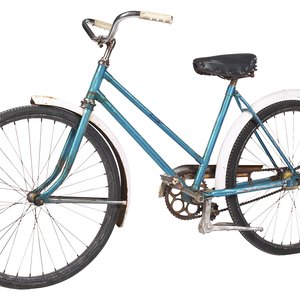
Goodwill Industries International, or just "Goodwill" to its many donors and customers, is a charitable organization that accepts material donations of clothing, housewares, office equipment and other items, then resells them at a low price. Goodwill accepts all kinds of goods, from shoes to computers, and by donating to it you can enjoy the satisfaction of clearing up space in your own home while giving something back to the community. This also helps the environment, since donating things you don't want instead of throwing them away reduces landfill growth.
Check Your Local Goodwill
Some Goodwill centers take bicycles, but others don't. It varies by location, so call or visit the Goodwill in your area to see if it accepts bicycles. If it doesn't, ask whether another Goodwill in the area does, or visit the other Goodwills yourself. Generally, if a Goodwill has the physical space to handle bicycles and the logistical means to get them into salable order and set them up on display, then it shouldn't have a problem accepting your donation.
Wash Your Bicycle
Goodwill won't accept filthy items, so before you donate your bicycle give it some love and care by cleaning it with soap, warm water, a sponge and a cloth to get rid of all the stains and grime. Rubbing alcohol or acetone can help with stains that the soap won't remove, but beware that acetone can damage the paint job, so only apply it sparingly and precisely.
Inspect Your Bicycle
Give your bicycle a thorough inspection. Make sure the seat is screwed on tighly and pump up the tires to the correct pressure. Make a note if the tires are leaky or the seat has trouble staying tight. Check out the reflectors with a flashlight to see that they all work. Look for any cracks or rust on the frame, screws and nuts. Also look for any spots where the paint has worn off. If it's safe to do so, take the bike on a test drive so that you can inspect the brakes and gear shifting.
Document All Problems
Once you know your bicycle's condition, make a detailed list of everything that's wrong with it, and include a printed copy of this when you donate the bike to Goodwill. This is an important safety measure and a great courtesy that will make your bike more likely to qualify for donation. Alternatively, to maximize the social value of your donation, you could take the bike into a repair shop and have these repairs made prior to donating it.
Alternatives to Goodwill
If your local Goodwill won't take your bike, and the bike is in safe, usable condition, you could try donating it to other local charities, such as community cycling centers and neighborhood rummage sales. You could also drive to a nearby town or city that does have a Goodwill, and donate it there. Finally, you could make a sign that says "Free Bicycle" and tape the inspection report to it, then just set the bike out on your curb.
References
Writer Bio
Josh Fredman is a freelance pen-for-hire and Web developer living in Seattle. He attended the University of Washington, studying engineering, and worked in logistics, health care and newspapers before deciding to go to work for himself.

